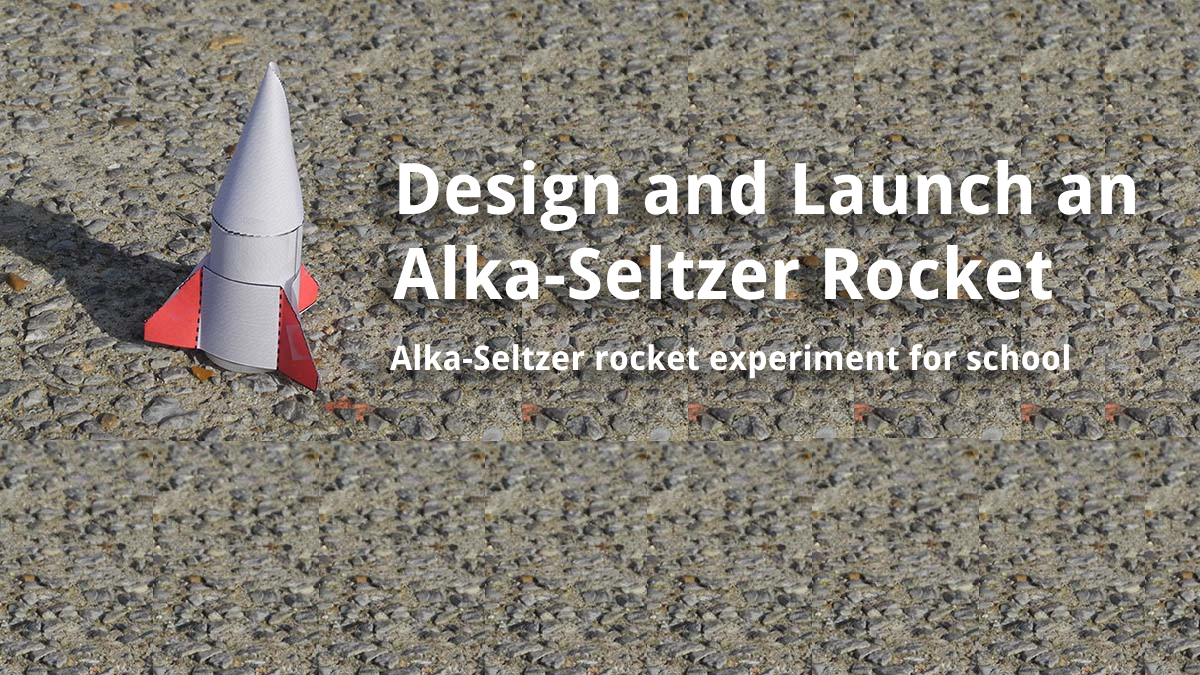Alka-Seltzer Rocket, Designing and launching an Alka-Seltzer rocket is a fun and educational that demonstrates principles of chemical reactions, pressure, and propulsion. Here’s a step-by-step guide to creating your Alka-Seltzer rocket:
How to make an Alka-Seltzer rocket
Materials Needed:
- Film canister (or a small plastic container with a tight-fitting lid)
- Alka-Seltzer tablets (or any effervescent antacid tablets)
- Water
- Safety goggles (recommended)
- Outdoor space or a large open area for launching
Instructions:
- Safety First: Before starting the activity, put on safety goggles to protect your eyes during the rocket’s launch.
- Preparation: Find a flat and open outdoor area for launching the rocket. Make sure there are no obstructions or people nearby.
- Rocket Design: If using a film canister, remove the lid and set it aside. If using a small plastic container, ensure the lid fits tightly. The container will serve as the body of the rocket.
- Adding Water: Fill the container about one-third (1/3) full with water. The amount of water used will affect the rocket’s performance, so you can experiment with different amounts to see how it changes the flight.
- Alka-Seltzer Tablet: Break an Alka-Seltzer tablet into a few small pieces. You can either crush the tablet or break it into chunks. Be quick with the next steps as the reaction will begin soon after adding the tablet.
- Adding the Tablet: Carefully drop the Alka-Seltzer tablet pieces into the container with water.
- Sealing the Rocket: Immediately put the lid back on the container tightly to secure it. Be cautious not to shake the container too much; just a gentle swirl to mix the tablet with water is enough.
- Preparing for Launch: Place the rocket on the ground with the lid facing down. Make sure everyone is at a safe distance, and the rocket is pointed away from people.
- Launch: Stand back and observe the rocket. After a few seconds, the pressure inside the container will build up, causing the lid to pop off, and the rocket will launch into the air.
- Safety Note: Do not stand directly over the rocket, and do not look into the container while the reaction is occurring.
Tips for Improvement and Experimentation:
- Experiment with different amounts of water and Alka-Seltzer tablets to see how they affect the height and distance of the rocket’s flight.
- Decorate the outside of the rocket with markers or stickers to make it more visually appealing.
- Try adding fins or stabilizers to the rocket to improve its stability during flight.
- Record your observations and results, and discuss what you’ve learned about chemical reactions, pressure, and propulsion.
Remember, this activity should be conducted under adult supervision, especially when working with children, to ensure safety during the launch process. Have fun with your Alka-Seltzer rocket and enjoy the excitement of scientific exploration!
| STEM Concept | Explanation and Application |
| Science Concepts | |
| Chemical Reaction | The reaction between water and Alka-Seltzer tablets produces carbon dioxide gas, creating pressure in the rocket. |
| Pressure | As the carbon dioxide gas builds up inside the container, it creates pressure, leading to the rocket’s launch. |
| Technology Concepts | |
| Propulsion System | The Alka-Seltzer tablet’s chemical reaction acts as the propulsion system that propels the rocket into the air. |
| Engineering Concepts | |
| Rocket Design | The design of the film canister or plastic container with a tightly-fitting lid is critical for a successful launch. |
| Stability | The rocket’s stability during flight can be improved by adding fins or stabilizers to prevent it from tumbling. |
| Mathematics Concepts | |
| Measurement | Measuring the amount of water used and the height and distance of the rocket’s flight involves mathematical skills. |
| Data Analysis | Recording observations and results allows for data analysis and comparison of different rocket designs. |
| Geometry | Designing and placing fins on the rocket involves geometric principles to ensure proper stability and aerodynamics. |
Alka-Seltzer rocket activity. Each concept can be further explored and expanded based on the level of understanding and age group of the participants. Additionally, this activity can be a starting point for exploring more complex STEM topics related to rockets, chemistry, aerodynamics, and data analysis.

